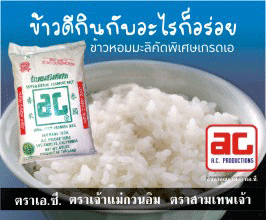LAW CORNER WITH JC 20 มีนาคม 2562
BUYING AND SELLING IN CALIFORNIA: THE ESCROW
Greetings everyone! I hope we all had a fun and safe time this past weekend celebrating Thai New Year (Songkran). Thank you to those who saw me at Wat Thai and stopped by to said 'Hi". It was great seeing everyone.
In this week's article, I will be discussing escrows. Although the issue of escrow is applicable to many different scenarios, it mostly comes up whenever you are buying a house (real estate escrow), or dealing with the purchase of an existing business (business escrow) such as a restaurant, massage/spa, clothing store, or any other for-profit business. In general, the issue of escrow will come up whenever you are dealing with the transfer-hold-transfer of funds.
What is an Escrow?
In the most basic terms, an escrow is a financial arrangement whereby 2 parties in a transaction hire an unbiased, unaffiliated 3rd party ("Escrow" Company or Party) to hold, administer, and distribute payment of certain funds, upon the performance of specified events according to "escrow instructions".
To better explain what an escrow is and what function it serves, here are some examples:
Real Estate: Purchasing Property
In the purchase of residential real property, involving a Seller and a Buyer, the interested Buyer submits an offer and if accepted by the Seller, deposits a certain amount known as an "earnest" deposit*. This deposit does not mean that the Seller will get this amount right away; instead, it is put into "escrow" as a way to show the Seller that the Buyer is truly interested ("earnest") in buying the property. Once the funds are deposited, the Escrow company holds this and any other subsequent deposits, until which time "escrow instructions" have been performed. It is after the instructions are satisfied that the funds are distributed to the Seller.
*NOTE: An "earnest" deposit or "earnest money" deposit is different from a "down payment", which is the amount paid at Settlement/Closing, and represents the difference between the purchase price and the amount supplied by the Lender, +/- other credits (such as the earnest money deposit) and subtractions. In other words, the earnest money deposit is included towards the Buyer's down payment when the transaction is finalized.
As this is not a discussion about purchasing property (which I will discuss in a future article), I will not go into inspections, satisfaction of contingencies and other pre-escrow closing aspects. In addition, it is important to note that Escrow companies serve a totally different function from Title companies.
Business Transactions: Purchasing an Existing Business
An escrow used in the context of purchasing an existing business serves a similar function as that used in the purchase of real estate, and then some. Once the Buyer and Seller negotiate a Purchase Agreement, and the Buyer is ready to deposit some funds, Escrow can be "opened". Besides holding on to funds deposited by the Buyer and distrubuting them after performance of all escrow instructions, the Escrow company will conduct a tax lien search, publish a required "Notice of Bulk Transfer" in a newspaper*, as well as obtain clearance certificates from State authorities such as the State Board of Equalization (Sales Tax), the Franchise Tax Board (State Income Tax), and the Employment Development Department (employment taxes). In addition, Escrow will require either an assisgnment of the current lease to the Buyer or a new, negotiated lease. Because the landlord must approve the Buyer, this has been one of the more pressing issues facing a smooth business purchase transaction! Another important consideration are restaurants with ABC permits (Beer and Wine License). For these, the Buyer should complete the application as soon as escrow is opened. Since this may take a while, it is recommended that the Buyer act as soon as possible.
*NOTE: The "Notice of Bulk Transfer" is necessary because it provides notice to any and all creditors of the Seller that there is a pending sale. Although most business sales are an "asset sales", meaning only the business assets are being sold, there are successor liabilities that are automatically passed on to the Buyer of a business unless clearances are obtained or liabilities cleared. If clearances are not obtained and/or liabilities not cleared prior to closing, creditors of these business assets could come after the buyer for furniture, fixtures, equipment, and inventory. The notice, therefore, serves a very important function - not only to notify creditors of a pending sale, but also to start the clock on any creditor to make a claim to the escrow since all creditors have 12 days from publishing to file their claim.
Do you need an Escrow?
I know the idea of using escrow for a buy-sell transaction may turn many people off. The common complaint I have heard is that it costs too much and it takes too long. Price and time are relative concepts and it just depends on your circumstances, situation, and risk tolerance. In some circumstances (i.e., such as where sales of assets are under $10,000 or more than $5,000,000), CA bulk sales law does not apply and it is okay not to use escrow, but for most, I would definitely recommend it. When a sale of all assets are valued between $10,000 to $2,000,000, it is considered 'small cash' sales and CA bulk sales law is applicable. As such, regardless of escrow, you must comply with the requirements set forth by the Uniform Commercial Code of California. Considering the amount of time, sweat and money you are intending to invest, why would you not use escrow? As you have read, Escrow serves an important function - to safe guard both the Buyer and Seller; and in my opinion, should be considered an investment in its usage.
As always, if you have any questions still left unanswered or you have general questions regarding other legal issues, or even if you have comments, please email me at: JC4LAW@HOTMAIL.COM or contact my office at (818) 846-5639, or my Thai direct line at (818) 505-4921. Also be sure to check us out on the web at: WWW.JC4LAW.COM, and now on FACEBOOK at: https://www.facebook.com/ThaiAttorney Be sure to follow (and "like") me for the most recent updates in the law!
Disclaimer: The information contained herein have been prepared for informational purposes only and are not to be considered legal advice unless otherwise specified. If you have a specific question regarding your personal case, please contact the Law Offices of Joseph Chitmongran for a full consultation.


































